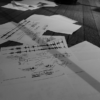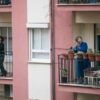Documentation

“The Language of Serendipity” – Hannah Harder
The authors of “Interdisciplinary Research Boosted by Serendipity,” (2014) describe the concept of serendipity, or unplanned discovery, as productive in interdisciplinary endeavors. Allowing for serendipitous discovery is not only facilitated through an open mind, but one that has the cognitive and creative drive to draw connections between seemingly disparate events (Darbellay, Moody, Sedooka & Steffen…
Read more
“Can we Find Serendipity in Event Planning During a Pandemic?” – Polyniki Katrantsioti
Without disregarding the immense loss that the entertainment industry faced through the year 2020, it is important to note that there has been a huge leap in what live streaming services and digital technology have to offer. By using the definition Walpole gave to serendipity, as “the art of discovering things ‘by accident and sagacity…
Read more
“Science-fictionalizing Contemporary Visual Epistemologies: What Might Projection Technologies of the Future Look Like?” – Danny Steur
In “Next Slide Please,” Jennifer Eisenhauer discusses a genealogy of image projection technologies: the magic lantern, the optical lantern and the nowadays omnipresent PowerPoint (2006, 199, 211). Or, more accurately: Eisenhauer dives into the discourses surrounding, and the visual epistemologies belonging to, these projection technologies, which have shifted from magic vision (the magic lantern used…
Read more
“Phantasmagoria Aesthetics: How Knowledge, Communication, and the Spectacle Operate in the Horror Genre” – Naomi Tidball
Frank Kessler, Jamilla Notebaard, and Nico de Klerk’s presentation, enlightened seminar listeners on the history of the Magic Lantern, and how the magic lantern was a (light-)source in transmitting knowledge to students. It is also worth noting, the magic lantern’s use for the spectacle; at the end of the 18th century, phantasmagoria shows were “illuminated…
Read more
“Interactive Multi-Sensory Environments and Their Utilization in Education” – Polyniki Katrantsioti
Education and technology have been intertwined ever since the first burst of technological advancements and their dynamic entrance into the educational system. In light of the discussion held in the last Transmission in Motion seminar I would like to discuss the emergence of interactive multi-sensory environments (iMSEs) their use in primary school education, and the…
Read more
“Using Slide Shows Asks for Reconsideration” – Justyna Jakubiec
Trying to imagine studying and working without slide shows in the background might prove to turn into a highly challenging quest. That is especially valid nowadays, considering the ongoing pandemic that makes quite a significant number of people stay in their homes. Perhaps that certainty and obviousness characterizing our approach to slide shows somehow overshadow…
Read more
“Configurations of Vision, Technology, and Knowledge: What Comes Next?” – Eleonora Stacchiotti
During the last session of Transmission in Motion’s series of seminars, Professor Frank Kessler and researchers Jamilla Notebaard and Nico de Klerk introduced us to their work, which takes into consideration and analyzes ways to divulgate knowledge through different technological apparatuses. Kessler focused on the semiotic structure through which works of art are encountered by…
Read more
“Human-Technology Assemblages” – Anthony Nestel
In her article “Next Slide Please: The Magical, Scientific, and Corporate Discourses of Visual Projection Technologies” (2006) Jennifer F. Eisenhauer strips technological entities from a pre-determined, fixed meaning. According to Eisenhauer, “technology acquires meaning through a complex series of relations” (Eisenhauer 2006, 198-199). By means of a genealogy of slide projection technologies, Eisenhauer eloquently demonstrates…
Read more
“Disciplining Perception Through Technology” – Hannah Harder
Jennifer Eisenhauer’s work “Next Slide Please: The Magical, Scientific, and Corporate Discourses of Visual Projection Technologies” (2006) shows how material technology takes on meaning through complex relationships. We can see how discourse changes in historic and cultural contexts such as with the magic or scientific lantern. What interests me is the way that vision seems…
Read more
“Making a Scene” – Bernice Ong
Having attended the seminar ‘Knowledge Transmission with the Lantern’ by Frank Kessler, Jamilla Notebaard and Nico de Klerk (24 Feb 2021), I note that with the advent of projection tools such as the optic lantern and photographic slides, there arose critical shifts not just in terms of how knowledge was transmitted, but indeed, how the…
Read more
